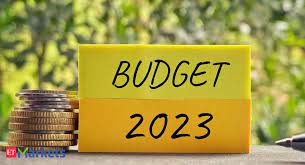Wg Cdr Mahesh Chander Sudan (Retd)
We, the people of India, have witnessed presentation of Annual Budget for FY 23-24 of Jammu and Kashmir in the Union Parliament by Finance Minister Smt. Nirmala Sitharaman. This is fourth consecutive budget in sequence being presented by Finance Minister of India as the youngest Union Territory is yet to have her maiden popular government elected democratically, though it is a matter of concern for each one of us who have been made to live in a dislodged democracy owing to multiple reasons. As regards the content of the budgetary layout of income and expenditure for the year 23-24, it is observed that an estimated expenditure of Rs. 1, 18, 500 crores has been earmarked that works out around Rs. 5,550 crores, an increase of meagre 4.68%, over the previous financial year. The budget outlay has further been distributed for Capital and Revenue expenditure of Rs. 41491 and 77009 crores respectively during the ensuing financial year 2023-24. Budgeting is an important exercise and potent instrument to diligently plan, execute and control public funds for larger interest of the State so that a sustained growth and development is ensured in a welfare oriented democratic pattern of governance.
The economy of Jammu and Kashmir Union Territory is primarily agro and allied services based. A look at the detailed allocation of funds for various sectors shows the budgetary focus exercised to correct the path of growth and development. It is seen that revenue receipts are expected to generate surplus revenue to the tune of 29052 to make it available for capital expenditure. The budgeted expenditure on capital head works out to 35% of the total budget layout. Further sectors wise allocations proposed in the budget though indicates rise in comparison with last financial years allotments yet it is observed that need based sectors prioritization could have helped in achieving more apt and prudent budgeting. The agriculture and horticulture sector apparently received required budgetary attention where as other sectors like Tourism, Education, Roads and bridges, Industry etc could have been dealt with some more seriousness. It is well established fact that tourism contributes major economic boost to JKUT economy besides generating job opportunities for employable youths. Expansion of tourism across the Urban and Rural areas can potentially accelerate the growth in the sector.
A diligent budgeting exercise enables the government mechanism to direct funds for optimum utilization based on the ground reality. There is no denying the fact that education institutes/schools run by UT government are in shambles and the infrastructure in terms of buildings, furniture and other classroom gadgets require immediate attention especially in the rural/hilly areas where students have limited options and are left either to suffer exploitation by private players or bear the brunt of ill-equipped government schools whereas so called professionals in the education sector talk of Smart Classrooms but of no significance for poor people of Jammu and Kashmir. A large number of school buildings require extensive repairs/renovations to make them suitable during extreme weather conditions affecting all regions of the Union Territory and meagre allotment of 1521 crores, mere 194 crores more than previous year, for both schools and higher education sector would prove grossly inadequate.
The weak road infrastructure especially in the rural areas, both in hills and plains, obstructs growth of tourism besides limiting accessibility of transportation for local population. Tourism being an important sector of the economy depends largely on good road connectivity and it needs priority budgeting to improve quality of roads and bridges especially to cater geographical limitations of the JKUT territory. Allocation made in the budget for 2023-24 apparently would affect the time line fixed for various roads and allied projects. Most of the ongoing road projects in the union territory including projects monitored by Union dispensation are over running their timeline for want of funds and mere increase of around 100 crore over previous budget allotment speaks for itself.
Another area that required attention of the concerned budget authority is health and Medical Education in the Union Territory and this sector actually stands nowhere as compared to other parts of the Indian Union. The allocation made under capital expenditure during ensuing financial year is around 2098 crores which is just around 215 crores more than previous year and the ongoing projects either new buildings for additional hospitals, recently formed medical colleges, upgradation of existing primary health Centres, reequipping hospitals with latest state of the art Laboratory equipment/gadgets may ultimately suffer due to inadequate budget allocations. A time bound and priority based budgetary support well insulated against inflationary pressure would not only energize health and medical education infrastructure but also strengthen the public image about this sector.
On an average, it is seen that allocations made towards capital expenditure on Agriculture and Horticulture Sector has though increased substantially but at the cost of health and education wherein the increase is hardly around 10-12% over the previous allocations. Though, the annual budget shows the allocations made for acquiring capital infrastructure during one year where most of these projects take years to get completed but a sustained financial flow of funds would enable completion of project as per time line and save public exchequer from inflationary effect.
7. Though, the budget has been categorized as futuristic and development oriented by ruling party but lack of focus on Education, Health, tourism and creation of employment opportunities at this juncture when the youths of Jammu and Kashmir Union Territory is suffering unprecedented highest rate of Unemployment, it may appropriately be treated as a routine exercise that has disappointed people of JKUT across the spectrum.
Trending Now
E-Paper


